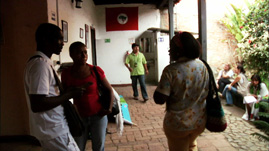Teachers' Domain - Digital Media for the Classroom and Professional Development
User: Preview


NARRATOR: The community’s legal problems erupted ten years ago …When a man named Hector Sarria obtained a license to mine La Toma’s gold. In early 2010 he started accelerating his plan.
SARRIA: I will enter to plan the infrastructure and start a business to begin to excavate the gold.
NARRATOR: According to the law passed in 1993, any permit for mining gold under the land of Afro-Colombians requires prior and informed consultation with their community councils. But Sarria says his license – from the Institute of Geology and Mining, Ingeominas – states there are no Afro-Colombians in La Toma.
SARRIA: Inside the territory I was assigned by Ingeominas, there isn’t any community or ethnic group. It’s mainly a mountain. Since there is no community in my area, who would I have approached for a previous consultation? The plants? The birds? The animals? In short, the wildlife and the vegetation?
NARRATOR: In March 2010, when Sarria applied for the right to evict the Afro-Colombians working in the mines of La Toma, he was under federal investigation for money laundering. Still, the court granted his request. With the eviction order in place, the stage was set for a confrontation.
SARRIA: I invite whoever wishes to come with me to the eviction there. We are going with policemen so you can truly see if what I’m saying is true or a lie, and who is right, me or them.
NARRATOR: The eviction will uproot thirteen hundred families who depend on La Toma’s mines. And it may be just the tip of the iceberg. Carabali says there are many illegal mining permits in Cauca.
CARABALI: The government is giving away these titles without fulfilling the laws of prior consultation.
NARRATOR: And a flood of new requests have come in.
CARABALI: If you look at the map everything is being asked for. At any point the title holders can try to kick us out. La Toma has resisted and we are working together to support them because if they evict them we are next.
NARRATOR: She’s been called to a critical meeting across town. Leaders from all over the region are joining forces to defend their lands.
CARABALI: Good morning! How are you?
CARABALI: It’s a very complex situation, because Colombia is one of the countries with the best laws to protect Afro-Colombians. Nevertheless those rights exist only on paper.
 Loading Standards
Loading Standards